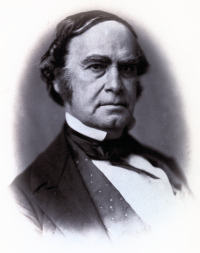With the first shots fired on Fort Sumter, April 12, and the capitulation of that Charleston, South Carolina, post two days later, the long dreaded “irrepressible conflict” burst into flames. No longer doubting, hesitant, and divided, the North leaped to its feat in one spontaneous demonstration of will and a determination to Save the Union!
A vital object of the federal forces in those first days was to secure an imperiled and all but defenceless Washington. The first state able and prepared to furnish troops for this purpose was Massachusetts, under Governor John A. Andrews. The 6th Massachusetts entrained for Washington April 17, arriving in Baltimore two days later. In that hostile southern sympathising town, avoided by Lincoln because of its uncertain temper two months before, the Massachusetts troops were met and attacked by a rioting mob of anti-unionists while marching through the streets to transfer from the Philadelphia to the Washington trains. In the exchange of shots several on both sides were killed. The threat to Washington rose higher and higher, cut off from the North.
Such a state of tension ensued that Union Governor Hicks pleaded with the federal government to send no more troops through his unruly city. The remainder of the Massachusetts troops, the 8th, were ordered not to disembark when they arrived before that town by boat shortly thereafter. Railroad tracks and bridges were torn up to prevent the arrival or departure of additional troops. Washington was completely cut off.
In the meanwhile other troops were already enroute to Washington. The 7th New York entrained from New York City April 19, the day of the Baltimore riots. At Philadelphia they were joined by Samuel R. Curtis, hurrying on his way to Washington from Keokuk at the news of the attack on Sumter. With his military experience and his congressional standing, his aid was eagerly welcomed by Col. Lefferts of the 7th New York. From Philadelphia the regiment traveled by train to Perryville, thence by the Steamship Boston to Annapolis. At this point Curtis picks up the story again in his family correspondence.
Off Annapolis Steamer
Boston Apl 22 1861
My dear wife
I wrote you yesterday1 just as we were entering the mouth of the Chespeak and just as I was called to a Council of War.
The Col it seems had no definite directions as to his route and called us to consult as to whether he had best to up the Potomac direct to Washington or up the Chespeak to this place. From the dispatches which he had it seemed the idea of the department that our route should be this way & the map also showed this would be the best as the bay is so wide we can avoid batteries on the shore. We passed up therefore without any molestation and find Genl Butler2 of Massachusetts with 700 Volunteers who are laying off in another steamer
I went with the Col and Capt Hamilton3 (this latter was formerly an officer of the army and aid for many years to Genl Scott now a private in this Regiment.) to see Genl Butler He is directed to establish a depot at this place and he arrived here just in time to save the great and glorious Ship Constitution which was about to be seised by a party on their way from Baltimore to seise her. There was also great danger of the Navy School which is here. We are going to land and make temperary fortifications and try to open the way to Washington.
It seems the railroad from this point to Washington is torn up but it is only about 35 miles and we can walk that if we cannot go by rail.
Of course my military experience and services are in demand and I am busy assisting Col Marshall Lefferts and Genl B F Butler being I suppose you may say on the staff of each.
Just at present à am franking letters to the wives and sweethearts of the men who seem to think I am assigned to this special duty As their letters all report the proceedings of the expedition I consider all the letters on public service reporting for the public good From the number they present I should think they are all newspaper reporters, and from the address of their letters they all seem to be of the upper ten in N York for they direct to 22nd 21st and other of the fine localities of that city.4
I have not had my boots off except at Philadelphia since I left home and have since I came on this boat eaten only hard biscuit and one small bit of stake which I obstained for 25 cents yesterday. But I am in excellent health and spirits and only feel fearful that you and Sadie will not get earlier news from me and may think me among the killed in Baltimore or some other place
Affectionately & everyone
Saml. R. Curtis
1. Letter not found.
2. A stormy figure in national politics for the next twenty years, a prewar Democrat, he vigorously supported the war measures of the Republican party, served as a Brigadier and Major General in the federal army, was elected to Congress, 1867-1875, 1877-1879, supported the Radicals in their attacks on Johnson.
3. Schuyler Hamilton, graduate of West Point, 1837, captain in the Mexican War, he resigned from the army in 1855, enlisted as a private in the 7th New York State Militia April 19. Later Brigadier General of volunteers in 1862, resigned in 1863.
4. The 7th New York, due to its flashy gray and blue trimmed uniforms and its aristocratic membership was quickly called “dandies” on their arrival in Washington.
